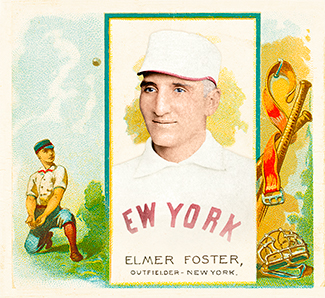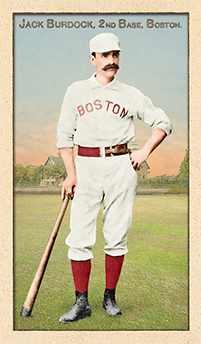- Series: 1888 Champion New York Giants
- City: New York
- Team: Giants
- League: National League
Elmer Ellsworth Foster (1861-1946) was an outfielder with the New York Metropolitans, New York Giants and Chicago Colts over a six year span beginning in 1886. The very rare baseballer who threw left and batted right, Foster achieved a career batting average of .187.
- One of the first five major leaguers born in Minnesota
- Played at Haverhill with future Hall of Famers Wilbert Robinson and Tommy McCarthy
- Noted for his speed on the base paths, Foster always had an explanation if caught stealing: “Why, I wasn’t a bit tired. Why should I have stopped running?”
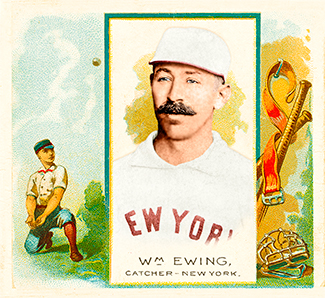
- Series: 1888 Champion New York Giants
- City: New York
- Team: Giants
- League: National League
- Hall: National Baseball Hall of Fame
William Ewing (1859-1906) was the premier catcher of the 19th century, honored for decades after his early death as even, perhaps, the greatest player of all time. A scourge at bat, Buck hit over .300 ten times. He played behind the plate with courage and style, crouching close to the hitter so as to shave precious seconds off his inerrant throws. Ewing had debuted with the remarkable Troy Trojans in 1880 and joined four future Hall-of-Famers in moving to NYC in ‘83. The sturdy catcher may have been the primary inspiration for Jim Mutrie’s “my Giants!” exclamation that led to the new identity of the Gothams. An arm injury on a raw spring day curtailed his tenure behind the plate from 1891 on. Such a magnetic figure couldn’t escape the turmoil of the Players’ League controversies and Ewing was sometimes pilloried for lax effort. Despite such caviling, Ewing left as indelible a mark on the game’s first century as anyone. Upon his induction to Cooperstown (among the first six of the “pre-modern” era), he was hailed by Connie Mack as the greatest catcher he had seen and he had seen most.
- “Buck” was a derivative of “Buckingham,” bestowed on the budding star by an admiring scribe who wanted to add gravitas to the youngster’s reputation
- Played all nine positions and managed 3 different teams over 7 seasons
- Was the first catcher elected to the Hall of Fame; and the second 19th century player elected (after Cap Anson)
- Elected to Hall of Fame: 1939
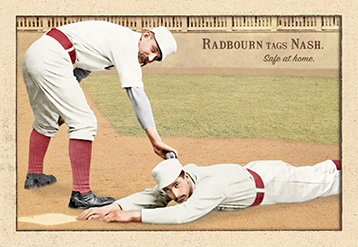
- Series: 1880s: Diamond Duos
- City: Boston
- Team: Beaneaters
- League: National League
- Hall: National Baseball Hall of Fame
Old Hoss Radbourn:
Charles Gardner Radbourn (1854-1897). An elite pitcher for 5 teams over 12 seasons, Radbourn owns the single-season Wins record with either 59 or 60 (sources vary) in 1884 – the year in which he became baseball’s 2nd triple Crown winner with 441 Ks & a 1.38 ERA. In 1884, Radbourn started 40 of his team’s last 43 games and won 36 of them. In the 1884 World Series, Radbourn started and won all three games, giving up only 3 runs. Including the postseason, Old Hoss won 62-63 games in 1884 and threw over 700 innings.
- NL Triple Crown: 1884
- NL Wins champ: 1883, 1884
- 309 career Wins
- Pitched no-hitter: 1883
- Elected to Hall of Fame: 1939
Billy Nash:
William Mitchell Nash (1865-1929) made one invaluable contribution to baseball: he scouted & recruited Napoleon Lajoie, bringing him to the Philadelphia Phillies in 1896. By that time, Nash had mostly played out his ML career as a steady-hitting 3rd baseman for the Boston Beaneaters. He compiled a respectable .275 lifetime average and, in 1895, was declared by Sporting Life magazine “the best fielding third baseman in the League.” Traded for future Hall of Famer Billy Hamilton to the Phillies, Nash was player-manager when he found Lajoie who was pounding the ball for the Fall River Indians in the New England League.
- Nash broke into the majors with his hometown Richmond Virginians of the old AA in 1884 before finding a home wih the NL Beaneaters
- Best year was 1887: .295 AVG with 84 RBI
- Bill James ranks Nash 49th amongst third basemen all-time
- Sporting Life touted his $7500 compensation in ’91 as money well-spent
Auction History
Cartophilia
Old Judge Pose: 377-2
- Series: Beginnings: 1880's
- City: Boston
- Team: Beaneaters
- League: National League
John J. “Black Jack” Burdock (1852-1931) began and ended his 18 year career in Brooklyn, first for the Atlantics and retiring from the Bridegrooms (Grooms). Played for the Hartford Dark Blues during their 1st year in the new National League, ‘76, and the next when Hartford became the Brooklyn Hartfords for a year.
- Sandwiched in between his stints in Brooklyn were 10 years with the Boston Beaneaters
- Was player/mgr for the Boston Beaneaters’ 1883 pennant winner, leading the club in average at .330
- One of the best infield defenders of his era, Burdock led the NL in putouts by a 2nd baseman five straight years, 1876-1880
- Led his league in fielding percentage by a 2nd baseman 6 times
- Achieved a career .250 batting average with 1,231 hits, 778 runs and 501 RBI
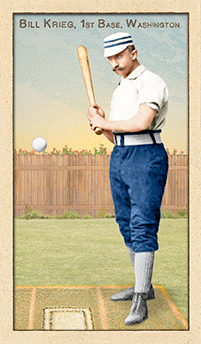
- Series: Beginnings: 1880's
- City: Washington, D.C.
- Team: Nationals
- League: National League
William Frederick Krieg (1859-1930) was a powerhouse in the minors, but barely left an impression in the big leagues. Coming out of Notre Dame, Krieg joined the Northwestern League's Springfield and Peoria teams in 1883. The following season he got a chance at the big time as the Union Association multiplied opportunities for young pro players. He signed on with the bi-city Chicago/Pittsburgh entry as their catcher, playing in 71 games with a .247 average. Over the next three seasons, Bill would roam among three other major league clubs and various minor league teams. His stints in the American Association and National League were brief and his output paltry.
When he finally resigned himself to play in the minors permanently, Krieg came into his own. In 1887 with the Minneapolis Millers he batted .402, second in the Northwestern League. He then became a terror in the Western Association, hitting .324 with St. Joseph in '89 and .339 with Milwaukee in ‘92, good for his first batting title. His second title was historically good, when he ravaged WA pitchers for an astounding .452 performance with the Rockford Forest Citys in 1895. He was the team's slugger, tallying 15 triples and 12 home runs.
While Krieg's time in the majors was brief, he showed remarkable durability in the game. He finally retired as a player in 1901 at age 42, but served one more season as manager for the Southern League Chattanooga squad. Bill even returned for one last hurrah as manager of Muscatine of the Central Association in 1912.
